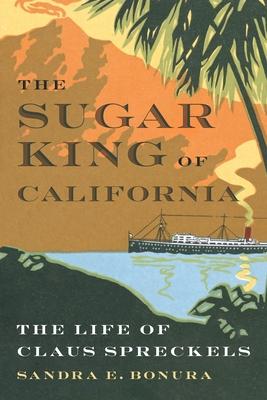Claus Spreckels (1828-1908) emigrated from his homeland of Germany to the United States with only seventy-five cents in his pocket, built a sugar empire, and became one of the richest Americans in history alongside John D. Rockefeller, Warren Buffett, and Bill Gates. Migrating to San Francisco after the gold rush, Spreckels built the largest sugar beet factory of its kind in the United States. His sugar beet production in the Salinas Valley changed the focus of valley agriculture from dry to irrigated crops, resulting in the vast modern agricultural-industrial economy in today’s "Salad Bowl of the World." When Spreckels gave America its first sugar cube, he became the "Sugar King."
The indomitable Spreckels was a colorful and complicated character on both sides of the Pacific. A kingpin in the development of the Hawai’i-California sugarcane industry, he wielded a clenched fist over Hawai’i’s economy for nearly two decades after occupying a position of unrivaled power and political influence with the Hawaiian monarchy, while also advancing major technology developments on the islands. The Sugar King’s legacy continued as the Spreckels family developed large portions of California, building and breaking monopolies in agriculture, shipping, railroading, finance, real estate, horse breeding, utilities, streetcars, and water infrastructure, and building entire towns and cities from infrastructure to superstructure. In The Sugar King of California Sandra E. Bonura tells the rags-to-riches story of Spreckels’s role in the developments of the sugarcane industry in the American West and across the Pacific, triumphing in a milieu rife with cronyism and corruption and ultimately transforming California’s industry and labor. Harshly criticized by his enemies for ruthless business tactics but loved by his employees, he was unapologetic in his quest for wealth, asserting "Spreckels’s success is California’s success." But there’s always a cost for single-minded determination; the legendary family quarrels even included a murder charge. Spreckels’s biography is one of business triumph and tragedy, a portrait of a family torn apart by money, jealousy, and ego.| FindBook |
有 1 項符合
The Sugar King of California: The Life of Claus Spreckels的圖書 |
 |
The Sugar King of California: The Life of Claus Spreckels 作者:Bonura 出版社:University of Nebraska Press 出版日期:2024-06-01 語言:英文 規格:精裝 / 400頁 / 22.86 x 15.24 cm / 普通級/ 初版 |
| 圖書館借閱 |
| 國家圖書館 | 全國圖書書目資訊網 | 國立公共資訊圖書館 | 電子書服務平台 | MetaCat 跨館整合查詢 |
| 臺北市立圖書館 | 新北市立圖書館 | 基隆市公共圖書館 | 桃園市立圖書館 | 新竹縣公共圖書館 |
| 苗栗縣立圖書館 | 臺中市立圖書館 | 彰化縣公共圖書館 | 南投縣文化局 | 雲林縣公共圖書館 |
| 嘉義縣圖書館 | 臺南市立圖書館 | 高雄市立圖書館 | 屏東縣公共圖書館 | 宜蘭縣公共圖書館 |
| 花蓮縣文化局 | 臺東縣文化處 |
|
|
圖書介紹 - 資料來源:博客來 評分:
圖書名稱:The Sugar King of California: The Life of Claus Spreckels
內容簡介
作者簡介
Sandra E. Bonura is a historian, researcher, and writer. A retired professor of education and school counseling, she is the author of Empire Builder: John D. Spreckels and the Making of San Diego (Nebraska, 2020), Light in the Queen’s Garden: Ida May Pope, Pioneer for Hawai’i’s Daughters, and An American Girl in the Hawaiian Islands: Letters of Carrie Prudence Winter, 1890-1893.
|











